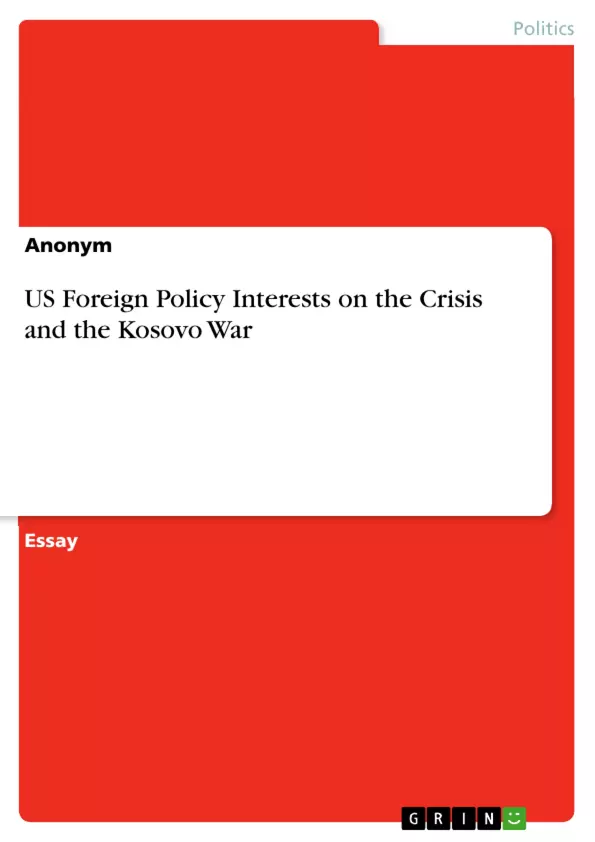The American foreign policy engagement on the Kosovo issue begins with the American Congressman Joseph DioGuardi since 1985, who succeeds in convincing congressional colleagues that the regime of Slobodan Milosevic exercises violence against the Albanian population in Kosovo. From the congressmen initially, the issue was dealt with as a violation of human rights and democratic negotiation. President Bush warns Slobodan Milosevic of using force in the event of a Kosovo conflict. The Dayton Accords set aside the Kosovo issue. This agreement obliges Kosovo Albanians to form the KLA as the only factor to protect from Serbian military, paramilitary, and police violence that exerts continuous violence and genocide against the Kosovo Albanian population. American foreign policy in coordination with the European community urgently seeks a peaceful conference between the parties to the conflict. Despite the organized peace conference, opposing sides do not reach an agreement between themselves and the international community convinces the Kosovar side to sign the deal and take military action against the Serbian army. The Rambouillet conference in france was organized by US President Bill Clinton and Secretary of State Madeleine Albright. This attitude of American politics is proved by the agreement reached with the Albanian side and the NATO intervention in Kosovo. The failure of the US missionary Richard Holbrooke to convince Slobodan Milosevic forced the international community to intervene militarily against the Serbian army. On 24 March 1999, US President Bill Clinton ordered NATO Secretary General Javier Solana to commence airstrikes against Serbian military targets in the former Yugoslavia. After 78 days of air strikes Serbia finally accepts the agreement and signed it. On June 10, 1999, NATO was deployed in Kosovo and assumed the security of the country.
Keywords: American foreign policy, Kosovo, Rambouillet, agreement, NATO.
Inhaltsverzeichnis (Table of Contents)
- Warning to Serbia ”red line” by President George W. Bush about Kosovo
- Kosovo issue at Deyton Conference on the former Yugoslavia
- The Role of the US Diplomacy at Rambouillet Conference
- Rambouillet Agreement and NATO Intervention
Zielsetzung und Themenschwerpunkte (Objectives and Key Themes)
This text analyzes the American foreign policy engagement on the Kosovo issue, focusing on the events leading up to the NATO intervention in 1999. It highlights the key role of the US in seeking a peaceful resolution to the conflict, while also underscoring the importance of safeguarding the human rights and democratic principles for the Albanian population in Kosovo.
- US foreign policy and the Kosovo conflict
- Human rights violations and democratic negotiation
- The role of the international community in conflict resolution
- NATO intervention and its impact on Kosovo
- The significance of the Rambouillet Agreement
Zusammenfassung der Kapitel (Chapter Summaries)
- Warning to Serbia ”red line” by President George W. Bush about Kosovo: This chapter details the early engagement of the US on the Kosovo issue, focusing on the efforts of Congressman Joseph DioGuardi to raise awareness about the suffering of Kosovo Albanians. It emphasizes the warning issued by President Bush in 1992 regarding potential military action against Serbia in the event of a conflict in Kosovo.
- Kosovo issue at Deyton Conference on the former Yugoslavia: This chapter examines the Kosovo issue within the context of the Dayton Accords, highlighting the lack of a comprehensive solution for Kosovo at the conference. It discusses the formation of the Kosovo Liberation Army (KLA) and the increasing tensions and violence in Kosovo leading up to the Rambouillet Conference.
- The Role of the US Diplomacy at Rambouillet Conference: This chapter focuses on the role of US diplomacy in the Rambouillet Conference, emphasizing the efforts of Madeleine Albright and the US in convincing the Albanian delegation to accept an agreement. The chapter details the pressure exerted on both parties and the ultimate success in reaching a transitional agreement that placed Kosovo under international protection.
Schlüsselwörter (Keywords)
The main focus of this text lies on US foreign policy, Kosovo, the Rambouillet Agreement, NATO intervention, and the conflict resolution efforts in the region. The text explores the complex interplay between human rights, international diplomacy, and military intervention in the pursuit of peace and stability.
- Citar trabajo
- Anonym (Autor), 2020, US Foreign Policy Interests on the Crisis and the Kosovo War, Múnich, GRIN Verlag, https://www.grin.com/document/1143966




